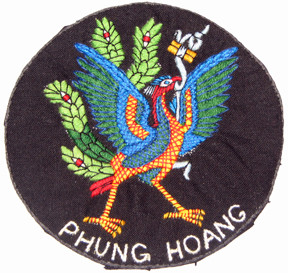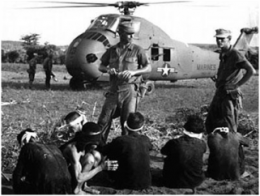Difference between revisions of "Phoenix Program"
(image fix) |
m (quote subject change) |
||
| (21 intermediate revisions by 5 users not shown) | |||
| Line 1: | Line 1: | ||
| − | {{event | + | {{work|An article worth expanding as it is highly relevant today}}{{event |
|wikipedia=https://en.wikipedia.org/wiki/Phoenix_Program | |wikipedia=https://en.wikipedia.org/wiki/Phoenix_Program | ||
| − | |constitutes=torture, murder, research, social control | + | |constitutes=torture, murder, research, social control, terrorisation |
|image=Phoenix Program.jpg | |image=Phoenix Program.jpg | ||
|start=1965 | |start=1965 | ||
|end=1972 | |end=1972 | ||
|locations=Vietnam, Laos, Cambodia | |locations=Vietnam, Laos, Cambodia | ||
| + | |sourcewatch=http://www.sourcewatch.org/index.php/Phoenix_Program | ||
| + | |description=A clandestine [[CIA]] research project into the use of [[terror]] as a means of [[social control]]. Techhniques from South East Asia, were later developed in Latin America | ||
}} | }} | ||
| − | [[ | + | The '''Phoenix Program''' was a clandestine [[CIA]] research project into [[social control]]. [[Doug Valentine]] described it as {{SMWQ |
| + | |text=a highly [[bureaucratized]] system for dispensing with people who cannot be ideologically assimilated. | ||
| + | |format=inline | ||
| + | |subjects=Phoenix Program | ||
| + | |authors=Douglas Valentine | ||
| + | |source_name=Feed Your Need To Read | ||
| + | |source_URL=http://www.feedyourneedtoread.com/feature/inside-the-cias-use-of-terror-during-the-vietnam-war/ | ||
| + | }} | ||
| + | It explored the utility of extreme [[violence]] for purposes of [[social control]]. The [[Vietnam War]] allowed the [[CIA]] to carry out systematic terrorisation of whole populations, using [[murder]], [[torture]] and [[rape]], developing expertise which they refined in [[Latin America]] in the [[1970s]] before applying them in [[Mexico]] and increasingly in [[USA]] itself.<ref name=ug693>http://www.unwelcomeguests.net/693</ref> Researcher [[Douglas Valentine]] writes that it “set the stage for the "[[War on Terror]]"”.<ref>http://web.archive.org/web/20150516221341/http://www.feedyourneedtoread.com/feature/inside-the-cias-use-of-terror-during-the-vietnam-war/</ref> It may have lead to, or intensified the [[serial killer]] phenomenon in the US in the years thereafter. | ||
[[image:Phoenix Program chopper.png|left|260px]] | [[image:Phoenix Program chopper.png|left|260px]] | ||
| + | |||
==Official narrative== | ==Official narrative== | ||
| − | In 2015, citing [[Alfred McCoy]], [[Wikipedia]] suggests that by 1972, Phoenix operatives had neutralized 81,740 suspected NLF operatives, informants and supporters, of whom | + | In [[2015]], citing [[Alfred McCoy]], [[Wikipedia]] suggests that by [[1972]], Phoenix operatives had neutralized 81,740 suspected NLF operatives, informants and supporters, of whom 26-41,000 were killed.<ref>[http://books.google.com/books?id=FVwUYSBwtKcC&pg=PA68 Alfred W. McCoy (2006). A question of torture: CIA interrogation, from the Cold War to the War on Terror. Macmillan. p. 68. ISBN 978-0-8050-8041-4.]</ref><ref name=hersh03>http://www.newyorker.com/archive/2003/12/15/031215fa_fact?currentPage=all</ref> Typically, it has a section entitled "Allegations of torture". |
| + | |||
| + | === Province Interrogation Center === | ||
| + | The Province Interrogation Center program was run by [[John Muldoon]].<ref>http://www.cryptocomb.org/Muldoon.html</ref> It established a secret interrogation center in every one of South Vietnam's 44 provinces. | ||
| + | |||
| + | === "Counter Terror" teams=== | ||
| + | "[[Counter Terror]]" teams were armed units which the [[CIA]] used to try to terrorise villagers away from support of the [[Vietcong]]. They used informers to try to identify [[Vietcong]] in rural areas.<ref name=gb358>https://soundcloud.com/guns-and-butter-1/phoenix-as-the-model-for-homeland-security-and-the-war-on-terror-douglas-valentine-358</ref> These were later renamed "Provincial Reconnaissance Units" after CIA officials "became wary of the adverse publicity surrounding the use of the word 'terror'".<ref>https://books.google.com/books?id=FVwUYSBwtKcC&pg=PA63</ref> | ||
| + | |||
| + | ==Research== | ||
| + | {{YouTubeVideo | ||
| + | |code=C0PLKj4bBpg | ||
| + | |subjects=Phoenix Program | ||
| + | |caption=Trump Admin Raising Phoenix Program From the Ashes - [[Douglas Valentine]] joins [[Corbett Report]] - [https://altcensored.com/watch?v=YXs4VOwNVjA archived] | ||
| + | |align=left | ||
| + | |width=320px | ||
| + | }} | ||
| + | The CIA had a long standing interest in [[interrogation]] techniques, including death threats and [[torture]] of prisoners. While the physical pain is relatively predictable, mental factors are crucial. If the effects on individuals are complex, how much more complex the effects on groups such as a village or an entire nation? When does [[psychopathic]] violence cause populations to submit, when to resist? Such distinctions are of great importance to any group ready to try to control subject populations by any means necessary. [[William Casey]], station chief in Saigon, decided to make these issues the subject of formal research{{cn}}. | ||
| + | |||
| + | The research was not only on subject populations, but upon those doing the torturing - while [[sadism]] can be learned, healthy non-sociopathic subjects can be crippled by [[PTSD]] after being involved in such atrocities. This observation helped the perpetrators understand the need for [[enemy images]] to desensitize personnel, hence campaigns such as the "[[war on terrorism]]". | ||
| + | |||
| + | ==Development== | ||
| + | Lessons learned from the Phoenix Program facilitated [[US intervention]]s worldwide, as refined techniques were applied across the world in a range of violent US-backed interventions in a range of locations from [[South America]] to [[Indonesia]]. [[Matthew Hoh]] suggested in [[2017]] that Pheonix influenced the US war in [[Afghanistan]] where the intention was "to brutally subjugate and punish the people, mostly rural Pashtuns, who support the [[Taliban]] and will not give in to the corrupt American run government in [[Kabul]]."<ref>https://www.antiwar.com/blog/2017/10/24/cia-in-afghanistan-operation-phoenix-redux/</ref> | ||
| + | |||
| + | ===South America=== | ||
| + | In [[South America]] in the [[1970s]], the CIA used the tactics of Phoenix Program to assist autocratic governments' suppression of [[democratic]] self-expression.<ref name=ug693/> One of the legacies of such brutal government policies is the fact that South America now boasts the most widespread opposition to repression such as [[torture]] and [[kidnapping]] worldwide. | ||
| + | |||
| + | ==Continuation== | ||
| + | Lessons from the Phoenix Program continue to inform the [[deep state]]. The amoral calculus of might is right is increasingly being applied in [[Mexico]] and in USA itself.<ref name=ug693/> The "counter terror" teams used to terrorise the rural Vietnamese became the model for "[[counter terrorism]]" operations worldwide.<ref name=gb358/> | ||
| + | |||
| + | ==Exposure== | ||
| + | The leading researcher into the Phoenix Program is [[Douglas Valentine]], whom [[William Casey]] sent to interview dozens of CIA officers involved. Many of these officers were comfortable talking with Valentine, and spent hours or even days recounting their memories of the program. In total, he interviewed nearly 100 CIA officers about the program.<ref name=gb358/> | ||
{{SMWDocs}} | {{SMWDocs}} | ||
| − | {{ | + | ==References== |
| + | {{reflist}} | ||
Latest revision as of 05:27, 26 January 2022
 | |
| Date | 1965 - 1972 |
|---|---|
| Location | Vietnam, Laos, Cambodia |
| Interest of | Jim Steele, Douglas Valentine |
| Description | A clandestine CIA research project into the use of terror as a means of social control. Techhniques from South East Asia, were later developed in Latin America |
The Phoenix Program was a clandestine CIA research project into social control. Doug Valentine described it as “a highly bureaucratized system for dispensing with people who cannot be ideologically assimilated.” [1] It explored the utility of extreme violence for purposes of social control. The Vietnam War allowed the CIA to carry out systematic terrorisation of whole populations, using murder, torture and rape, developing expertise which they refined in Latin America in the 1970s before applying them in Mexico and increasingly in USA itself.[2] Researcher Douglas Valentine writes that it “set the stage for the "War on Terror"”.[3] It may have lead to, or intensified the serial killer phenomenon in the US in the years thereafter.
Contents
Official narrative
In 2015, citing Alfred McCoy, Wikipedia suggests that by 1972, Phoenix operatives had neutralized 81,740 suspected NLF operatives, informants and supporters, of whom 26-41,000 were killed.[4][5] Typically, it has a section entitled "Allegations of torture".
Province Interrogation Center
The Province Interrogation Center program was run by John Muldoon.[6] It established a secret interrogation center in every one of South Vietnam's 44 provinces.
"Counter Terror" teams
"Counter Terror" teams were armed units which the CIA used to try to terrorise villagers away from support of the Vietcong. They used informers to try to identify Vietcong in rural areas.[7] These were later renamed "Provincial Reconnaissance Units" after CIA officials "became wary of the adverse publicity surrounding the use of the word 'terror'".[8]
Research
| Trump Admin Raising Phoenix Program From the Ashes - Douglas Valentine joins Corbett Report - archived |
The CIA had a long standing interest in interrogation techniques, including death threats and torture of prisoners. While the physical pain is relatively predictable, mental factors are crucial. If the effects on individuals are complex, how much more complex the effects on groups such as a village or an entire nation? When does psychopathic violence cause populations to submit, when to resist? Such distinctions are of great importance to any group ready to try to control subject populations by any means necessary. William Casey, station chief in Saigon, decided to make these issues the subject of formal research[citation needed].
The research was not only on subject populations, but upon those doing the torturing - while sadism can be learned, healthy non-sociopathic subjects can be crippled by PTSD after being involved in such atrocities. This observation helped the perpetrators understand the need for enemy images to desensitize personnel, hence campaigns such as the "war on terrorism".
Development
Lessons learned from the Phoenix Program facilitated US interventions worldwide, as refined techniques were applied across the world in a range of violent US-backed interventions in a range of locations from South America to Indonesia. Matthew Hoh suggested in 2017 that Pheonix influenced the US war in Afghanistan where the intention was "to brutally subjugate and punish the people, mostly rural Pashtuns, who support the Taliban and will not give in to the corrupt American run government in Kabul."[9]
South America
In South America in the 1970s, the CIA used the tactics of Phoenix Program to assist autocratic governments' suppression of democratic self-expression.[2] One of the legacies of such brutal government policies is the fact that South America now boasts the most widespread opposition to repression such as torture and kidnapping worldwide.
Continuation
Lessons from the Phoenix Program continue to inform the deep state. The amoral calculus of might is right is increasingly being applied in Mexico and in USA itself.[2] The "counter terror" teams used to terrorise the rural Vietnamese became the model for "counter terrorism" operations worldwide.[7]
Exposure
The leading researcher into the Phoenix Program is Douglas Valentine, whom William Casey sent to interview dozens of CIA officers involved. Many of these officers were comfortable talking with Valentine, and spent hours or even days recounting their memories of the program. In total, he interviewed nearly 100 CIA officers about the program.[7]
Related Document
| Title | Type | Publication date | Author(s) | Description |
|---|---|---|---|---|
| Document:Masters of Persuasion | article | 2005 | David Guyatt |
References
- ↑ http://www.feedyourneedtoread.com/feature/inside-the-cias-use-of-terror-during-the-vietnam-war/ Feed Your Need To Read
- ↑ a b c http://www.unwelcomeguests.net/693
- ↑ http://web.archive.org/web/20150516221341/http://www.feedyourneedtoread.com/feature/inside-the-cias-use-of-terror-during-the-vietnam-war/
- ↑ Alfred W. McCoy (2006). A question of torture: CIA interrogation, from the Cold War to the War on Terror. Macmillan. p. 68. ISBN 978-0-8050-8041-4.
- ↑ http://www.newyorker.com/archive/2003/12/15/031215fa_fact?currentPage=all
- ↑ http://www.cryptocomb.org/Muldoon.html
- ↑ a b c https://soundcloud.com/guns-and-butter-1/phoenix-as-the-model-for-homeland-security-and-the-war-on-terror-douglas-valentine-358
- ↑ https://books.google.com/books?id=FVwUYSBwtKcC&pg=PA63
- ↑ https://www.antiwar.com/blog/2017/10/24/cia-in-afghanistan-operation-phoenix-redux/
